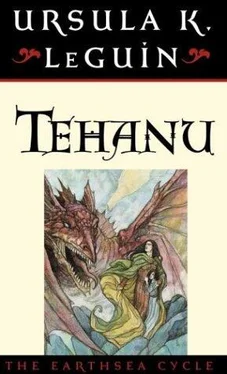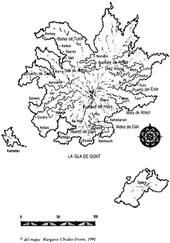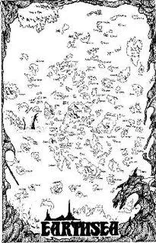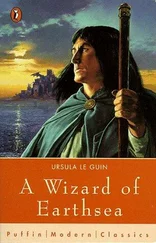Ursula Le Guin - Tehanu The Last Book of Earthsea
Здесь есть возможность читать онлайн «Ursula Le Guin - Tehanu The Last Book of Earthsea» весь текст электронной книги совершенно бесплатно (целиком полную версию без сокращений). В некоторых случаях можно слушать аудио, скачать через торрент в формате fb2 и присутствует краткое содержание. Город: New York, Год выпуска: 1990, Издательство: Atheneum, Жанр: Фэнтези, на английском языке. Описание произведения, (предисловие) а так же отзывы посетителей доступны на портале библиотеки ЛибКат.
- Название:Tehanu The Last Book of Earthsea
- Автор:
- Издательство:Atheneum
- Жанр:
- Год:1990
- Город:New York
- ISBN:нет данных
- Рейтинг книги:4 / 5. Голосов: 1
-
Избранное:Добавить в избранное
- Отзывы:
-
Ваша оценка:
- 80
- 1
- 2
- 3
- 4
- 5
Tehanu The Last Book of Earthsea: краткое содержание, описание и аннотация
Предлагаем к чтению аннотацию, описание, краткое содержание или предисловие (зависит от того, что написал сам автор книги «Tehanu The Last Book of Earthsea»). Если вы не нашли необходимую информацию о книге — напишите в комментариях, мы постараемся отыскать её.
Tehanu The Last Book of Earthsea — читать онлайн бесплатно полную книгу (весь текст) целиком
Ниже представлен текст книги, разбитый по страницам. Система сохранения места последней прочитанной страницы, позволяет с удобством читать онлайн бесплатно книгу «Tehanu The Last Book of Earthsea», без необходимости каждый раз заново искать на чём Вы остановились. Поставьте закладку, и сможете в любой момент перейти на страницу, на которой закончили чтение.
Интервал:
Закладка:
But Aspen had come. He had paid his respects and no more to Ogion, and always, Moss said, stayed up at the mansion. Since then, less and less had been seen of the grandson, and it was said now that he lay day and night in bed, “like a sick baby, all shriveled up,” said one of the women who had been into the house on some errand. But the old lord, “a hundred years old, or near, or more,” Moss insisted-she had no fear of numbers and no respect for them-the old lord was flourishing, “full of juice,” they said. And one of the men, for they would have only men wait on them in the mansion, had told one of the women that the old lord had hired the wizard to make him live forever, and that the wizard was doing that, feeding him, the man said, off the grandson’s life, And the man saw no harm in it, saying, “Who wouldn’t want to live forever?”
“Well,” Tenar said, taken aback. “That’s an ugly story. Don’t they talk about all this in the village?”
Moss shrugged. It was a matter of “Let be” again. The doings of the powerful were not to be judged by the powerless, And there was the dim, blind loyalty, the rootedness in place: the old man was their lord, Lord of Re Albi, nobody else’s business what he did... . Moss evidently felt this herself. “Risky,” she said, “bound to go wrong, such a trick,” but she did not say it was wicked.
No sign of the man Handy had been seen up at the mansion. Longing to be sure that he had left the Overfell, Tenar asked an acquaintance or two in the village if they had seen such a man, but she got unwilling and equivocal replies. They wanted no part of her affairs. “Let be. . . . Only old Fan treated her as a friend and fellow-villager. And that might be because his eyes were so dim he could not clearly see Therru.
She took the child with her now when she went into the village, or any distance at all from the house.
Therru did not find this bondage wearisome. She stayed close by Tenar as a much younger child would do, working with her or playing. Her play was with cat’s cradle, basket making, and with a couple of bone figures that Tenar had found in a little grass bag on one of Ogion’s shelves. There was an animal that might be a dog or a sheep, a figure that might be a woman or a man. To Tenar they had no sense of power or danger about them, and Moss said, “Just toys.” To Therru they were a great magic. She moved them about in the patterns of some silent story for hours at a time; she did not speak as she played. Sometimes she built houses for the person and the animal, stone cairns, huts of mud and straw. They were always in her pocket in their grass bag. She was learning to spin; she could hold the distaff in the burned hand and twist the drop-spindle with the other. They had combed the goats regularly since they had been there, and by now had a good sackful of silky goathair to be spun.
“But I should be teaching her,” Tenar thought, distressed. “Teach her all, Ogion said, and what am I teaching her? Cooking and spinning?” Then another part of her mind said in Goha’s voice, “And are those not true arts, needful and noble? Is wisdom all words?”
Still she worried over the matter, and one afternoon while Therru was pulling the goathair to clean and loosen it and she was carding it, in the shade of the peach tree, she said, “Therru, maybe it’s time you began to learn the true names of things. There is a language in which all things bear their true names, and deed and word are one. By speaking that tongue Segoy raised the islands from the deeps. It is the language dragons speak.”
The child listened, silent.
Tenar laid down her carding combs and picked up a small stone from the ground. “In that tongue,” she said, “this is tolk. “
Therru watched what she did and repeated the word, tolk, but without voice, only forming it with her lips, which were drawn back a little on the right side by the scarring.
The stone lay on Tenar’s palm, a stone.
They were both silent.
“Not yet,” Tenar said. “That’s not what I have to teach you now.” She let the stone fall to the ground, and picked up her combs and a handful of cloudy grey wool Therru had prepared for carding. “Maybe when you have your true name, maybe that will be the time. Not now. Now, listen. Now is the time for stories, for you to begin to learn the stories. I can tell you stories of the Archipelago and of the Kargad Lands. I told you a story I learned from my friend Aihal the Silent. Now I’ll tell you one I learned from my friend Lark when she told it to her children and mine. This is the story of Andaur and Avad . As long ago as forever, as far away as Selidor, there lived a man called Andaur, a woodcutter, who went up in the hills alone. One day, deep in the forest, he cut a great oak tree down. As it fell it cried out to him in a human voice. . . .
It was a pleasant afternoon for them both.
But that night as she lay by the sleeping child, Tenar could not sleep. She was restless, concerned with one petty anxiety after another-did I fasten the pasture gate, does my hand ache from carding or is it arthritis beginning, and so on. Then she became very uneasy, thinking she heard noises outside the house. Why haven’t I got me a dog? she thought. Stupid, not to have a dog. A woman and child living alone ought to have a dog these days. But this is Ogion’s house! Nobody would come here to do evil. But Ogion is dead, dead, buried at the roots of the tree at the forest’s edge. And no one will come. Sparrowhawk’s gone, run away. Not even Sparrowhawk anymore, a shadow man, no good to anyone, a dead man forced to be alive, And I have no strength, there’s no good in me. I say the word of the Making and it dies in my mouth, it is meaningless. A stone. I am a woman, an old woman, weak, stupid. All I do is wrong. All I touch turns to ashes, shadow, stone. I am the creature of darkness, swollen with darkness. Only fire can cleanse me. Only fire can eat me, eat me away like-She sat up and cried out aloud in her own language, “The curse be turned, and turn!”-and brought her right arm out and down, pointing straight to the closed door. Then leaping out of bed, she went to the door, flung it open, and said into the cloudy night, “You come too late, Aspen. I was eaten long ago. Go clean your own house!”
There was no answer, no sound, but a faint, sour, vile smell of burning-singed cloth or hair.
She shut the door, set Ogion’s staff against it, and looked to see that Therru still slept. She did not sleep herself, that night.
In the morning she took Therru into the village to ask Fan if he would want the yarn they had been spinning, It was an excuse to get away from the house and to be for a little while among people. The old man said he would be glad to weave the yarn, and they talked for a few minutes, under the great painted fan, while the apprentice scowled and clacked away grimly at the loom. As Tenar and Therru left Fan’s house, somebody dodged around the corner of the little cottage where she had lived. Something, wasps or bees, were stinging Tenar’s neck and head, and there was a patter of rain all round, a thundershower, but there were no clouds- Stones. She saw the pebbles strike the ground. Therru had stopped, startled and puzzled, looking around. A couple of boys ran from behind the cottage, half hiding, half showing themselves, calling out to each other, laughing.
“Come along,” Tenar said steadily, and they walked to Ogion’s house.
Tenar was shaking, and the shaking got worse as they walked. She tried to conceal it from Therru, who looked troubled but not frightened, not having understood what had happened.
As soon as they entered the house, Tenar knew someone had been there while they were in the village. It smelled of burned meat and hair. The coverlet of their bed had been disarranged .
Читать дальшеИнтервал:
Закладка:
Похожие книги на «Tehanu The Last Book of Earthsea»
Представляем Вашему вниманию похожие книги на «Tehanu The Last Book of Earthsea» списком для выбора. Мы отобрали схожую по названию и смыслу литературу в надежде предоставить читателям больше вариантов отыскать новые, интересные, ещё непрочитанные произведения.
Обсуждение, отзывы о книге «Tehanu The Last Book of Earthsea» и просто собственные мнения читателей. Оставьте ваши комментарии, напишите, что Вы думаете о произведении, его смысле или главных героях. Укажите что конкретно понравилось, а что нет, и почему Вы так считаете.








